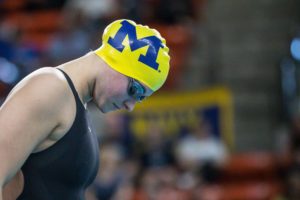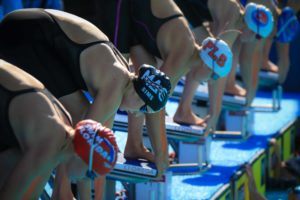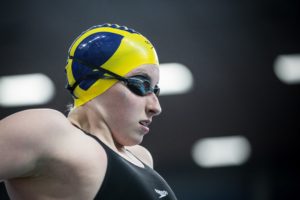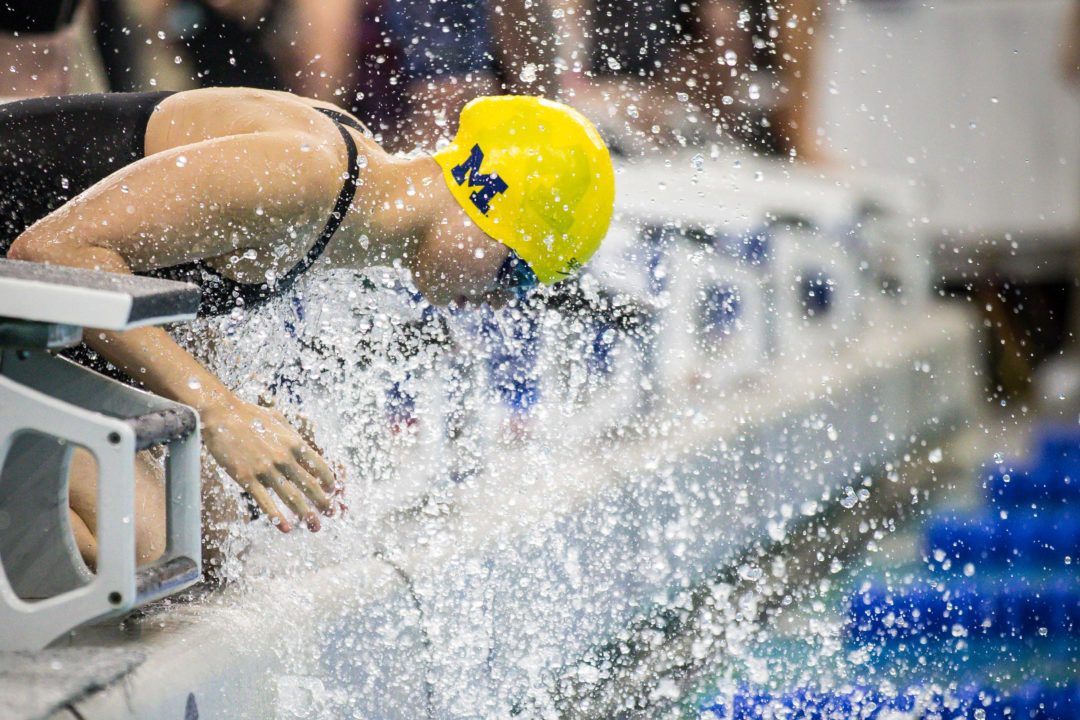We’ll be previewing the top 12 men’s and women’s programs for the 2019-2020 season – stay tuned to our College Swimming Previews channel to catch all 24. Can’t get enough college swimming news? Check out the College Preview issue of SwimSwam Magazine for more in-depth college swimming coverage, including a bird’s-eye view of the flood of coaching changes and our ever-popular rankings of the top 50 individual swimmers in college swimming.
#9 Michigan Wolverines
Key Losses: Siobhan Haughey (32 NCAA points, 4 NCAA relays), Catie DeLoof (31 NCAA points, 4 NCAA relays), Rose Bi (14 NCAA points,1 NCAA relay), Jamie Zhen Yeun (7 NCAA points), Taylor Garcia (2 NCAA relays)
Key Additions: Kaitlynn Sims (TX – distance/IM), Megan Glass (OH – fly/free), Katii Tang (Hong Kong – free), Octavia Lau (Canada – free/fly), Sophia Kudryashova (NJ – free), Mariella Venter (South Africa – back), Kate Kikilo (CO – back), Madeleine Bauer (NC – distance), Paige Sundermann (MI – diving), Lucy Hogan (IL – diving), Anna Hansen (MI – diving), Lauren Cheetham (OH – diving)
GRADING CRITERIA
We’re unveiling a new, more data-based grading criteria in this year’s series. Our grades this year are based on ‘projected returning points’, a stat of our own making. We started with our already-compiled “no senior returning points” (see here and here), which is effectively a rescoring of 2019 NCAAs with seniors removed and underclassmen moved up to fill those gaps. In addition, we manually filtered out points from known redshirts and swimmers turning pro early, while manually adjusting points for outgoing and incoming transfers and adding in projected points for incoming freshmen with NCAA scoring times, as well as athletes returning from injury or redshirts who are very likely NCAA scorers.
Since we only profile the top 12 teams in this format, our grades are designed with that range in mind. In the grand scheme of college swimming and compared to all other college programs, top 12 NCAA programs would pretty much all grade well across the board. But in the interest of making these previews informative, our grading scale is tough – designed to show the tiers between the good stroke groups, the great ones, and the 2015 Texas men’s fly group types.
- 5 star (★★★★★) – a rare, elite NCAA group projected to score 25+ points per event
- 4 star (★★★★) – a very, very good NCAA group projected to score 15-24 points per event
- 3 star (★★★) – a good NCAA group projected to score 5-14 points per event
- 2 star (★★) – a solid NCAA group projected to score 1-4 points per event
- 1 star (★) – an NCAA group that is projected to score no points per event, though that doesn’t mean it’s without potential scorers – they’ll just need to leapfrog some swimmers ahead of them to do it
We’ll grade each event discipline: sprint free (which we define to include all the relay-distance freestyle events, so 50, 100 and 200), distance free, IM, breaststroke, backstroke, butterfly and diving. Bear in mind that our grades and painstaking scoring formula attempts to take into account all factors, but is still unable to perfectly predict the future. Use these grades as a jumping-off point for discussion, rather than a reason to be angry.
2018-2019 LOOKBACK
A senior-heavy roster for the Wolverines came off a 4th-place 2018 showing with vigor, adding intriguing young Canadian prospect Maggie MacNeil to one of the NCAA’s best rosters.
The postseason started out with some early disappointment: Michigan was knocked off for the Big Ten crown by Indiana, losing by 84 points on the road in Bloomington.
But the Wolverines focus was clearly on the NCAA Championships, and they proved it a month later. Michigan rolled all the way to third place, its highest finish since the 1990s and just the third team in program history (on the women’s side) to earn a top-3 finish. Michigan was top-6 in all five relays, including NCAA runner-up finishes in the 200 and 400 free relays. The rookie MacNeil led with 45 individual points and a runner-up finish in the 100 fly.
Sprint Free: ★★★
Michigan retains a three-star rating here despite losing their top two sprint freestylers from last year. Siobhan Haughey was a 32-point-scorer between the 100 and 200 frees, and Catie DeLoof scored in the 50, 100 and 200.

Daria Pyshnenko (photo: Jack Spitser)
That’s a lot to lose. But Michigan is still projected to score 16 points in this discipline with Maggie MacNeil returning as the third overall 50 freestyler. MacNeil is coming off a huge summer, so it wouldn’t be surprising to see her continue to move forward – she went 21.49 last year in her first season swimming short course yards.
Michigan also returns NCAA invitee Daria Pyshnenko, who will be a junior. Pyshnenko was 22.23 and 48.53 individually last year, earning NCAA invites by hundredths in both swims. She went a couple tenths backwards in her 50 and then scratched the 100 at NCAAs, but focusing in on the relay the final day, she dropped a big 47.9 split on the anchor as Michigan took second overall.
The 200 is hurting, with the top four (Haughey, DeLoof, Bi, Postoll) all graduated. But there are also more reinforcements coming in there. Sierra Schmidt is the top returner, going 1:46.7 last year, a lifetime-best in her sophomore year. From there, it might be a bunch of freshman. Star distance prospect Kaitlynn Sims out of Texas has been 1:47.1, and dropped two and a half seconds last year. Megan Glass is 1:47.7, and Sophia Kudryashova 1:47.4.
(That doesn’t include Hong Kong’s Katii Tang, who has been 2:03.9 in long course and probably projects in the 1:48s in short course yards).
It might be some crossovers from other strokes filling in the other sprint free spots. Flyer Vanessa Krause was 22.8 at Big Tens in the 50 free. Junior Claire Maiocco is listed on the roster as a flyer, but went 23.0 and 50.7 at Big Tens last year. Meanwhile the freshman Kudryashova has been 23.2 and 50.2 in the shorter races.
Distance Free: ★★★★
You lose stars like Rose Bi and Becca Postoll and somehow remain loaded. Michigan returns mile A finalist Sierra Schmidt, who had a great sophomore season. She was 6th at NCAAs in the mile (15:50.1), and moves up to 4th with seniors factored out. Schmidt is also a returning scorer in the 500 free (13th last year in 4:37.99) and could threaten for an A final spot there.

Kaitlynn Sims (photo: Jack Spitser)
Michigan’s top recruit is Texas’s Kaitlynn Sims, one of the few prospects coming in with NCAA scoring times. Sims has been 15:57.3 in the mile, which would have been 11th at NCAAs last year. Sims is rising extremely fast, moving from 4:42.3/16:10 as a junior to 4:39.5/15:57 as a high school senior. If that improvement curve keeps up, she’ll be a two-event scorer and a likely A finalist in the mile.
Senior Chloe Hicks and sophomore Victoria Kwan were both 4:49 in the 500 last year. Only four swimmers logged a mile, and three graduated. But the freshmen class should plug in three distance swimmers: Sims, Canada’s Octavia Lau (whose long course times convert roughly to 4:48 and 16:38) and Hong Kong’s Katii Tang (conversions to 4:48 and 16:39).
Backstroke: ★★★
As with the sprint free, all the projected returning points here are from flyer MacNeil. MacNeil was 6th in the NCAA last year in the 100 back, going 50.63 (50.98 in the final). That was a young event and only one swimmer ahead of her graduates, but with Taylor Ruck taking a redshirt year, MacNeil moves up to 4th among returners.
Taylor Garcia was the top true backstroker and led off the medleys last year. She’s graduated, along with 52.7 DeLoof. The top candidates to lead off the medleys might be rising senior Chloe Hicks (53.8 at midseason last year and 1:53.8 in the 200 at Big Tens) or incoming freshman Mariella Venter. Venter was recruited as part of last year’s freshman class, but the South African didn’t compete and is currently listed as a freshman on the roster. She’s been 1:01.7 and 2:13.5 in long course – converting roughly to 53.1 and 1:55.6.
Venter and Hicks are both probably better in the 200, so Michigan is in better shape there.
Breaststroke: ★★★

Miranda Tucker (photo: Jack Spitser)
Michigan returns yet another scorer here: Miranda Tucker. The senior was 7th in the 100 breast last season and moves up to 5th when you factor out seniors. And that wasn’t even with her best time: Tucker was 58.2 at Big Tens, which would return #3 in the nation.
Where they need Tucker to step up is in the 200. She was 2:07.6 at Big Tens, but faded way back to 2:10.0 at NCAAs. That cost Michigan points somewhere in the double digits, as her season-best would have made the A final. The Wolverines could afford to lose those points last year, but this year they’ll need to be much more efficient with so many freestyle stars gone.
The depth is hurting here, with graduated Jamie Zhen Yeung their 2nd breaststroker last year. The fastest times returning on the team are 1:02 and 2:15.5 from junior Alex Hughes.
Butterfly: ★★★

Maggie Macneil (photo: Jack Spitser)
Maggie MacNeil effectively games our grading system, projecting 3-star points by herself in three different disciplines. This is the big one, though: MacNeil was #2 in the nation in the 100 fly, and all eyes will be on just how fast she goes after a massive World Championships upset this summer in long course meters. MacNeil, 49.5 last year, could very well be pushing the 49.0 barrier after her absurd long course drops from 58.3 to 55.8 over the spring and summer.
The depth here is actually pretty decent, especially in the 100. Alexis Margett (52.6) will be a junior, and Vanessa Krause (52.7) a senior. Junior Emma Cleason was 53.2 at midseason last year, and junior Claire Maiocco 53.7 at a last chance meet.
Meanwhile freshman Megan Glass, stolen from the home state of the rival Ohio State Buckeyes, brings in times of 53.2 and 1:57.1.
Krause is a likely scorer in the 200 after going 1:55.1 at midseason last year, even if she faded eight tenths and was 21st at NCAAs. Victoria Kwan was 1:57.1 as a freshman
IM: ★
Michigan had just two IM swims at NCAAs last year, and one of them was from the graduated Jamie Zhen Yeung. In addition, Siobhan Haughey was the team’s top 200 IMer by about five seconds, and she’s also graduated.
The breaststroker Tucker returns as an NCAA participant. She was 1:57.0 in the 200 IM at midseason last year and 1:57.5 at NCAAs. She’ll need some improvements to get to scoring range, and with her focus mostly on breaststroke, that’s less likely to happen here.
Sophomore Victoria Kwan is the best hope. She went 1:57.8 and 4:11.0 in the IMs last year, both within a second of an NCAA invite in her rookie campaign. Kwan is a Canadian who is still transitioning from meters into yards, and should still have improvements to make, especially after taking off more than a second from her long course 400 IM this summer.
The star distance freshman Kaitlynn Sims could contend in the 400 IM, too. She has to choose between a 1:47.1 freestyle and a 4:11.1 IM as her third event, but that IM is only a second away from NCAA invite level.
Diving: ★
Not typically a huge diving program, Michigan actually had two NCAA invitees last year and returns both. Christy Cutshaw was 28th on platform and Camryn McPherson 49th on 1-meter. Neither is a surefire scorer, but Cutshaw does move all the way up to 17th when you factor out seniors.
Michigan also loaded up on prospects, with four freshman divers joining the roster: Ohio’s Lauren Cheetham, Illinois’ Lucy Hogan and in-state prospects Paige Sundermann and Anna Hansen.
Relays
Reloading the relays will be the biggest challenge for Michigan, which still projects 9th in returning “no senior” points individually, but loses exactly half (10/20) of its relay legs. Those are impact losses, too: Haughey and DeLoof were the two best splits on the 400 and 800 free relays, and two of the three best legs of the 200 free relay.
The 800 is the toughest sell. With Haughey’s 1:40 and DeLoof’s 1:42 gone (not to mention 1:44 leadoff Bi), the team will probably have to rely on Schmidt and the freshman Sims to go 1:46s or better, and some combination of Glass, Kudryashova or Tang coming in with 1:47s. They’re all improving, but they’ll need huge years for this relay to even score, much less crack the top 10.
Things aren’t quite so bad in the sprints. MacNeil and Pyshnenko should bookend the 200 and 400 relays nicely. In the shorter relay, the flyer Krause might be up to a 21-high split, and perhaps 49-something. It’ll be open competition for the two free spots, with a bunch of 50-point types in the mix. Still, last year’s B final relays were mostly 47s and 48s, so these relays need huge improvements to score.
The medleys might actually be in better shape. Tucker remains an impact breaststroke leg, and Pyshnenko probably anchors both. The smart move might be to use MacNeil on backstroke and Krause or Margett on fly. But if Venter or Hicks can step up in backstroke, that allows Michigan to move MacNeil back to fly and get the full force of her talent on these relays. Unlike last year, the medleys may well be Michigan’s biggest-scoring relays.
2019-2020 Outlook

Mike Bottom (photo: Jack Spitser)
Michigan grades out pretty consistently across disciplines, but bear in mind that most of that comes from MacNeil in sprint free, back and fly. The losses from last year are significant, and they’re going to cut into relay points the most. Last season, Michigan scored about half of its 314 points on relays, and they’re very unlikely to repeat that 156-relay-point performance.
It’s a thinner roster, but a couple of elite-tier talents could keep them in the top 10. MacNeil is one of the top individuals in college swimming, and only getting better. (At this point, there’s no indication she plans to take an Olympic redshirt like so many other top Canadians, and she’s listed on the Michigan roster). Meanwhile Sims has a chance to be an excellent distance swimmer, and Tucker could be a top-scoring breaststroker, if she’s at her best come NCAAs.
Don’t expect another top-3 finish from Michigan. But don’t count them out of the top 10, either. We’ll know a lot more as we see the relays re-form this fall.

Definitely a drop off year for Michigan girls. Dont think they will win Big 10’s either. . . .The guys team on the other hand, will definitely be better this year!!
Coach Bottom looks atypically unhappy in the picture!
Couldn’t find a more flattering photo of Mike, huh…?
Lol
looks like an older Anthony Ervin
Schmidt has been 1:55 in the 200 fly
She has… but she can only swim three events. We’ve got her more likely to swim the 200 free like she did last year, to avoid the mile/200 fly combo on day 4.
Becca Postoll in Key Losses?
Never got the credit for her contributions but I think finishing 6, 14, 8 respectively (500, 200, 1650 free) and a member of the first place 800 FR at B1G 2019 are not points easily replaced. Four year NCAA individual qualifier. I would fit that in a key loss category.
For the sake of consistency, we only compile 2019 NCAA scorers in our “key losses” section. She’s mentioned in both freestyle sections later on, though, as a big loss to depth.
very similar to cases and a&m – both casas and macneil are carrying the team – power to them (though i think macneil can score more)